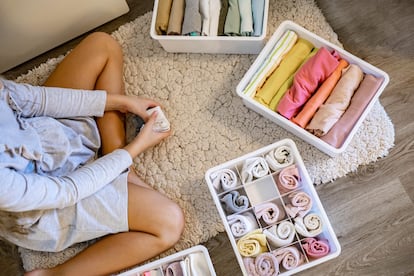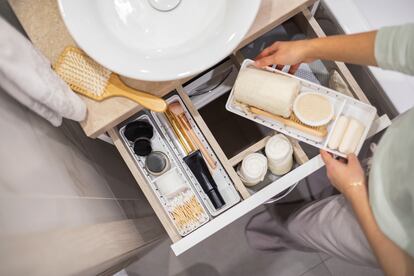Demystifying order: Why embracing chaos can be positive too
Although tidiness can eliminate visual noise and generate peace, an exaggerated interest in organizing our living spaces and routines could signal a lack of control over other, more important aspects

In 2014, an unknown Japanese woman came into our lives to impose order. Her name was Marie Kondo, and her mantra, “tidy up, change your life,” became as famous as her recipe for achieving it: getting rid of all those possessions that do not “spark joy.” Her book The Life-Changing Magic of Tidying Up conquered the best-seller lists of publications like The New York Times, Los Angeles Times, Publishers Weekly and The Wall Street Journal. Two books and a Netflix show later, there is hardly a soul who does not know, at least in passing, the guru of order and her KonMari method of tidying up.
Eight years have passed since then, and the new minimalist organization philosophies have gained followers and spread from home interiors to every aspect of our lives. Every day, platforms such as TikTok display the advantages of an organized lifestyle with devotees of the 5 to 9 routine showing the benefits of waking up at first light to practice sports or meditate – videos that have been described as “productivity porn.” Also on TikTok, there are experts in deep cleaning, how to organize tiny spaces and mindfulness routines of less than 10 minutes. Instagram also doesn’t exactly reward chaos, inviting users to upload images where symmetry and composition prevail. Planning has also reached the kitchen through phenomena such as batch cooking, which consists of cooking everything on Sunday in order to have ready meals available for the rest of the week.
True, order eliminates visual noise, generates greater serenity and provides a certain sense of control over our lives, but an excessive interest in organizing the spaces we inhabit and our daily routines could be a symptom of something else.
“I think there’s this drive to be neat and organized because the world around us feels so messy,” explains cultural critic Kyle Chayka, author of The Longing for Less, an essay on the history and evolution of minimalism, to EL PAÍS. “The last decade or so has been very chaotic,” he continues, alluding to the political turmoil and polarization in the United States and Europe, the pandemic, the war in Ukraine and the current economic crisis. “Focusing on our immediate surroundings, and making them as clean and comprehensible as possible, feels like the only possibility for us as individuals. We have to hack our own lives because controlling our external circumstances is impossible.”
Chayka notes that minimalism has been a common response in past hectic and turbulent times: “You can see trends of minimalism in particularly chaotic historical periods, like Heian Japan around 1000 AD and the Dutch iconoclasm in the 16th century, as well as the post-World War II era and the 1990s economic crash. We definitely crave a sense of control, but that can only extend to our immediate surroundings.”
It is easy to see why Marie Kondo and other minimalists appeal: “it is cheap to buy stuff, but expensive to buy space to keep all the stuff, so our homes become too full of our possessions. Marie Kondo offers a solution!” British economist, columnist and author Tim Harford, author of Messy: The Power of Disorder to Transform Our Lives, another bestseller that rejects Marie Kondo’s philosophy, told EL PAÍS.
We are accumulating more possessions than our parents and grandparents did: industrial production, the invention of plastic, improvements in transportation, a boom in furniture and low cost fashion have led us to accumulate goods. More often than not, this does not make us happier, but does take up space. At the same time, our homes have shrunk: we live in smaller apartments where, to get new things, you have to get rid of the old ones. “The strange thing is that this is often described as ‘tidying up’ or ‘orderliness.’ Most of Marie Kondo’s approach has nothing to do with getting organized – it’s about having less stuff. She explicitly says that organizational systems don’t work – and yet people still dream of organizing,” adds Hardford.

Marta Carmona is a public health psychiatrist and co-author of Malestamos: Cuando estar mal es un problema colectivo (When Being Unwell is a Collective Problem), a short essay which tries to provide collective answers to today’s mental health problems. The psychiatrist quotes Morticia Addams from The Addams Family to talk about human subjectivity: “What is normal for the spider is chaos for the fly,” she says, adding that one single, universal recipe will not work for everybody. “Some human beings channel and control their anxiety through the act of ordering elements in their environment, which generates a sense of control and peace of mind and helps them calm down, and there are others who don’t, and simply tidy up because everyone prefers to live in a tidy house instead of one that looks like a dump, but they don’t draw any real benefit from that.”
Like Chayka, Carmona points out that some narratives are suited to a time and place, and today order has become the social mandate to achieve a happy life: “The narratives of each era depend on living conditions: now that we live in small spaces, and we move in reduced spheres within the cities, narratives emerge that tell us that what is important is everything in which I can operate, which is my mini-environment and my mini-apartment.”
At this moment, as the psychiatrist points out, most discourses feed “these individualist narratives that propose: ‘if you want to, you can, because it’s only a matter of organizing.’ And this precept is not only considered natural and normal, but it’s also desirable and represents the path to happiness.” Not everything is black or white, nor does it work like a magic formula for each individual: trying to master every aspect of our lives through order can lead to frustration and dead ends, especially if behind a tidy drawer full of colored socks lies a false promise of happiness.
Is there some kind of magic in clutter? To Tim Hardford, the answer is a clear yes: “There is a place for tidiness (my kitchen is tidy, and so are my accounts) but many things are naturally messy – from the creative process to a conversation, from our careers to our love lives. If you try to impose order where it does not belong, nothing good will happen.” The KonMari method cannot be applied to improvisation or creativity, nor would they benefit from a strict 5 to 9 routine or a refrigerator full of food prepared on Sunday.
“I think mess and messiness have as much value as simplicity or minimalism,” says Kyle Chayka. “When people adopt minimalism to too extreme a degree, they force their entire lives into a preset pattern and aesthetic. There is never any surprise, just sameness everywhere.” Some can find peace and serenity in that lifestyle, but “mess can bring serendipity into our lives, giving us encounters with things we forgot about or inspiration in the chaos or detritus of daily life.”
Sign up for our weekly newsletter to get more English-language news coverage from EL PAÍS USA Edition
Tu suscripción se está usando en otro dispositivo
¿Quieres añadir otro usuario a tu suscripción?
Si continúas leyendo en este dispositivo, no se podrá leer en el otro.
FlechaTu suscripción se está usando en otro dispositivo y solo puedes acceder a EL PAÍS desde un dispositivo a la vez.
Si quieres compartir tu cuenta, cambia tu suscripción a la modalidad Premium, así podrás añadir otro usuario. Cada uno accederá con su propia cuenta de email, lo que os permitirá personalizar vuestra experiencia en EL PAÍS.
¿Tienes una suscripción de empresa? Accede aquí para contratar más cuentas.
En el caso de no saber quién está usando tu cuenta, te recomendamos cambiar tu contraseña aquí.
Si decides continuar compartiendo tu cuenta, este mensaje se mostrará en tu dispositivo y en el de la otra persona que está usando tu cuenta de forma indefinida, afectando a tu experiencia de lectura. Puedes consultar aquí los términos y condiciones de la suscripción digital.









































